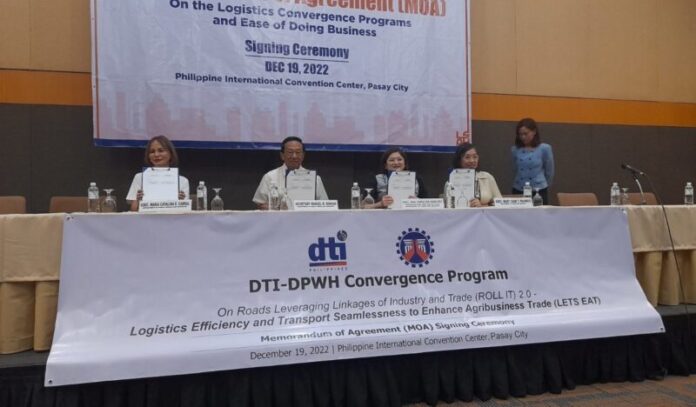
-
The Department of Trade and Industry signed agreements with the Department of Transportation and Department of Public Works and Highways aimed at improving logistics infrastructure in the country
-
DTI and DPWH on December 19 signed a memorandum of agreement for to ROLL IT 2.0—Logistics Efficiency and Transport Seamlessness to Enhance Agribusiness Trade (LETS EAT Program), focused on improving road infrastructure along routes used by trucks to transport food and agribusiness products
-
DTI and DOTr signed an agreement for the Logistics Efficiency and Transport Seamlessness for Growth Outcomes (LETS GO), which will identify logistics-related infrastructure the transport department will prioritize and implement to help increase trade, reduce logistics costs, and improve efficiency
-
DTI and DOTr also agreed to jointly promote ease of doing business by signing a MOA to harmonize sea freight and airfreight accreditation
The Department of Trade and Industry (DTI) signed agreements with the Department of Transportation (DOTr) and Department of Public Works and Highways (DPWH) aimed at improving logistics infrastructure in the country.
“The prime directive from the President is to reduce logistics costs and establish the Philippines as a logistics hub in Asia. That is clear, and when DTI conducted supra-regional consultations nationwide, it was also clear what the private sector is saying—we need better and more infrastructure,” Trade Secretary Alfredo Pascual said in a statement.
DTI and DPWH on December 19 signed a memorandum of agreement that renews and reformulates their working arrangement to jointly undertake the planning, budgeting, implementation, and monitoring of road projects that will enhance food security and logistics efficiency in the country.
DTI and DPWH previously signed a MOA creating the Roads Leveraging Linkages of Industry and Trade (ROLL IT Program), which from 2018 to 2023 had an allocated P60-billion budget for road upgrading projects that support priority industries under the Comprehensive National Industrialization Strategy.
Under the new MOA, the ROLL IT Program will be reformulated to ROLL IT 2.0—Logistics Efficiency and Transport Seamlessness to Enhance Agribusiness Trade (LETS EAT Program), which will be focused on improving road infrastructure along routes used by trucks to transport food and agribusiness products to markets, manufacturing centers, ports and airports, and logistics facilities such as warehouses and cold chain storages.
DTI on December 19 also signed a similar convergence program with the DOTr on Logistics Efficiency and Transport Seamlessness for Growth Outcomes (LETS GO), which will identify logistics-related infrastructure such as ports, airports, rail that the transport department will prioritize and implement to help increase trade, reduce logistics costs, and improve efficiency.
DTI and DOTr agreed to jointly promote ease of doing business by signing a MOA to harmonize sea freight and airfreight accreditation.
In 2021, the Logistics Services Philippines (LSPH) Project Streamlining was carried out by DTI to identify regulatory constraints in the freight forwarding sector. Among key findings are the separate and redundant accreditation requirements and processes for sea and air freight forwarders by DTI’s Fair Trade Enforcement Bureau (FTEB) and the Civil Aeronautics Board (CAB) of DOTr—two agencies mandated to issue licenses to operate.
DTI said its shared objective is to reduce documentary requirements, fees, and processing time and align with the standards set under Republic Act No. 11032, or the Ease of Doing Business and Efficient Government Service Delivery Act of 2018.
It also aims to make the accreditation process easy and eliminate steps and repetitive requirements. The agencies will start by streamlining of procedures between the two agencies, but the desired outcome is to make processing faster by making a single application for both services available online.
Earlier, CAB executive director Carmelo Arcilla said through the unified accreditation system, freight forwarders engaged in both air and sea freight operations would not have to go to two different offices as there will be a single application form and single set of requirements, steps, and fees for accreditation.
Pascual said these collaborative initiatives aim to propel the economy to a level that maximizes the country’s resources and helps eradicate poverty, which is one of the main priorities of the current administration.
The signing ceremony for the agreements were also attended by the LSPH, an informal aggrupation of private sector associations representing truckers, shipping lines, freight forwarders, customs brokers, warehouse operators, port users, and supply chain professionals. – Roumina Pablo




